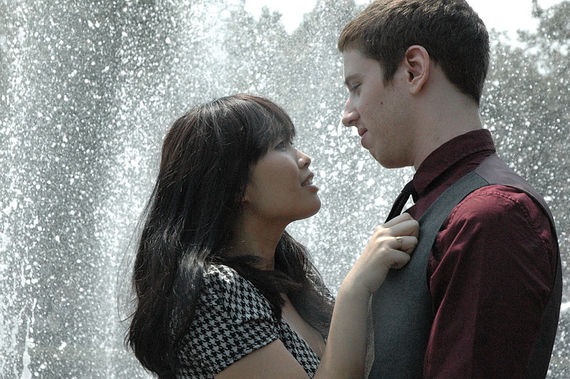 Our eyes are among our most amazing mysteries. Through our eyes, we let the world in. We see beauty -- along with what's not so beautiful. Through our eyes we search for each other, we see each other, and we connect -- or at least, we have the potential to connect. We can convey that we're here, that we're interested, and that we value the person we're with in this precious moment.
Our eyes are among our most amazing mysteries. Through our eyes, we let the world in. We see beauty -- along with what's not so beautiful. Through our eyes we search for each other, we see each other, and we connect -- or at least, we have the potential to connect. We can convey that we're here, that we're interested, and that we value the person we're with in this precious moment.
Eye contact helps infants grow and develop, and healthy emotional attachment is furthered through eye contact with an available and attentive parent. But while we're wired with a longing to connect, we may not take full advantage of those two hollow openings in our skull, which offer a remarkable capacity to connect us with life. I often hear clients complain that their partner does not make enough eye contact, leaving them feeling lonely and disconnected.
We want to be understood, appreciated, and valued. We think we want to be seen. But do we really? Sometimes, what we most deeply long for is often what we also most fear. Our eyes bring us delight, but they also open us to what can be scary.
When people look at you, what happens inside? How do you feel in your body? Do you welcome eye contact or shrink from it? Is it frightening, tantalizing, or both? At what point do you divert your eyes? Is there something inside you that you don't want others to see?
Being seen is something we long for. But it can also be terrifying. What might they see? Will they perceive our beauty, goodness, and wonderfulness? Or will they see something ugly about us -- our flaws, our unworthiness, our insecurity? Being human, our antennae silently probe for any hint of being shamed and criticized.
"Hell is other people," the renowned philosopher Jean-Paul Sartre famously declared, partly due to their capacity to fix us with their gaze and see us as an object rather than in our own subjectivity. If we quickly look away, we don't have to bear the brunt of any possible negative perceptions or the shame of being seen in a diminished way.
When you look into another's eyes, do you notice yourself judging them or simply being with them? Do you tend to put people in a box or look at them with open curiosity, spaciousness, and availability to be contacted.
Perhaps if we practice a more open way of seeing people -- staying relaxed with our breath and in our body, allowing our eyes to soften, being with them and letting them in, we'll notice how our presence allows them to relax and move toward us. The more we hold ourselves with gentleness and caring, the more quiet strength we may find to hold our gaze a little longer, especially with people we feel close to.
Eye contact, along with the connection it may bring, can become a kind of mindfulness practice. We can notice what we're experiencing in our stomach or heart as we gaze into our lover's magical eyes. Maybe there's a delightful sense of warmth and expansiveness, or a fear of losing ourselves.
If it feels right for you, perhaps notice how you feel extending your gaze with your partner. Settling into more relaxed eye contact with a good friend might also bring greater fulfillment.
This doesn't mean you should stare at people or make them feel uncomfortable. There is a natural rhythm of looking at people and looking away. When it feels right, perhaps we can hold our gaze a little longer, relishing a simple moment of human connection. Life becomes more fulfilling as we become present to the rich connections that are freely available if we awaken to them.
Flickr image by Jacopo Werther.
This revised post originally appeared on PsychCentral.com.